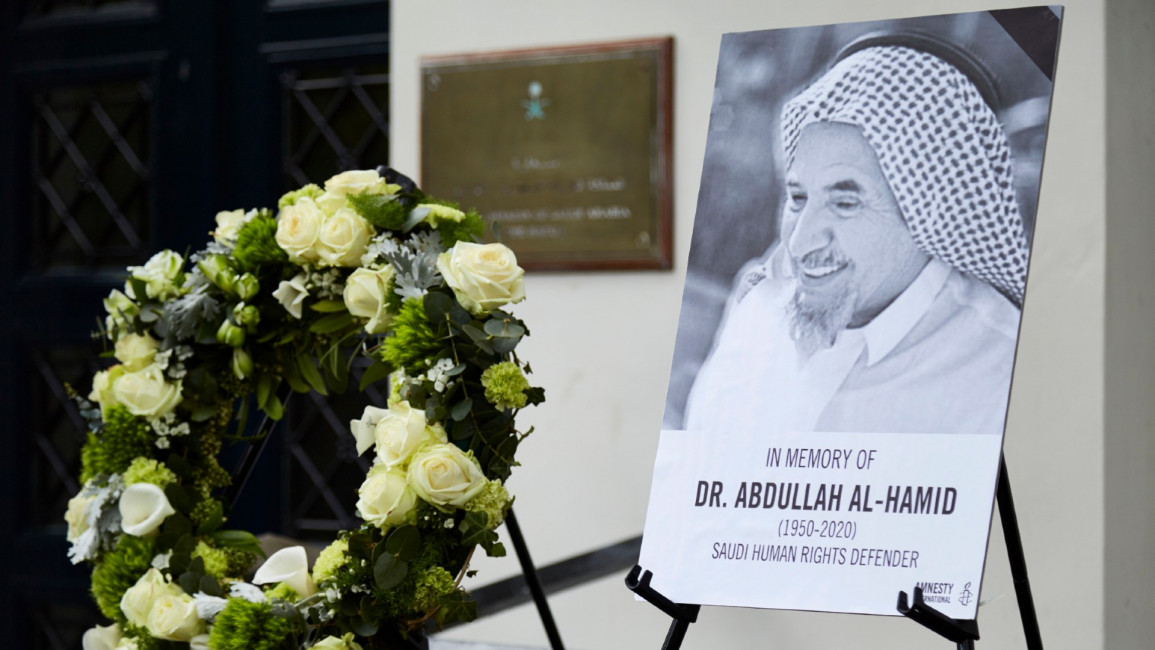Saudi authorities arrest writers, lawyer over tweets mourning activist who died in detention
Al-Hamid, a 69-year-old human rights activist, died in detention on 24 April after suffering a stroke and entering a coma earlier that month.
Prior to Al-Hamid's passing, prison authorities barred him from receiving medical treatment for his pre-existing health conditions. The activist was medically advised to undergo heart surgery in January due to his declining health, a procedure he was also denied.
According to Amnesty International, Al-Hamid was threatened into silence by prison authorities and told he would be prevented from seeing his family if he informed his relatives about his ailing health.
Prisoners of Conscience, a Twitter account that documents the cases of political prisoners in Saudi Arabia, said it has confirmed the kingdom's arrest of three men who mourned Al-Hamid's death on Twitter.
The men have been detained since the beginning of Ramadan on 24 April, the date of Al-Hamid's passing, the account said.
The detainees were identified as writer Aqel Al-Bahili, writer Abdulaziz Al-Dakhil and lawyer Sultan Al-Ajami.
|
On 24 April Al-Ajami tweeted about his last call with Al-Hamid prior to the activist's passing, along with a hashtag that translates to "Abdullah Al-Hamid is a martyr".
"During the last communication between us on Tuesday 7-4 [sic], he began to sound tired and nonetheless, he was steadfast," the tweet read. "An accountant informed me that he had finished fasting for a month, as if on the inside, he sensed that he would not fast for Ramadan with us."
"After two days, we mourn the news that he suffered a stroke," he added. "My condolences to his family, ourselves, the homeland, and humanity for the loss of a great thinker, revolutionary and reformer."
Al-Dakhil's tweet, posted on 25 April, similarly eulogised Al-Hamid.
"Dr. Abdullah Al-Hamid, the man who was devoted to his homeland and to high values, morals and sincere citizenship, has passed on to his God," read Al-Dakhil's tweet. "But he did not leave the hearts of the faithful to the homeland of the believers, by providing advice without fear or shame, and without vested interest. May God have mercy on you, Abu Bilal."
Al-Hamid, a founding member of the Saudi Civil and Political Rights Association (ACPRA), was sentenced to 11 years in jail in March 2013.
He was convicted on multiple charges, including "breaking allegiance" to the Saudi ruler, "inciting disorder" and seeking to disrupt state security, according to Amnesty.
Rights activists have decried medical negligence in Saudi Arabia's secretive prisons, especially as the kingdom battles a Covid-19 outbreak.
On Sunday, Saudi journalist Saleh Al-Shehi, an outspoken critic of the government, died after his release from prison on medical grounds in May.
According to the Gulf Centre for Human Rights, Al-Shehi, whose health had deteriorated during his two and a half years in detention, was transferred to an intensive care unit at a hospital in Arar in June.
He was then transferred to a hospital in capital Riyadh, where he died of an undisclosed illness.
The grisly murder of Washington Post columnist Jamal Khashoggi inside the Saudi consulate in Istanbul, Turkey has been a notable blemish on the crown prince's highly touted reform drive in the kingdom.
Follow us on Facebook, Twitter and Instagram to stay connected



